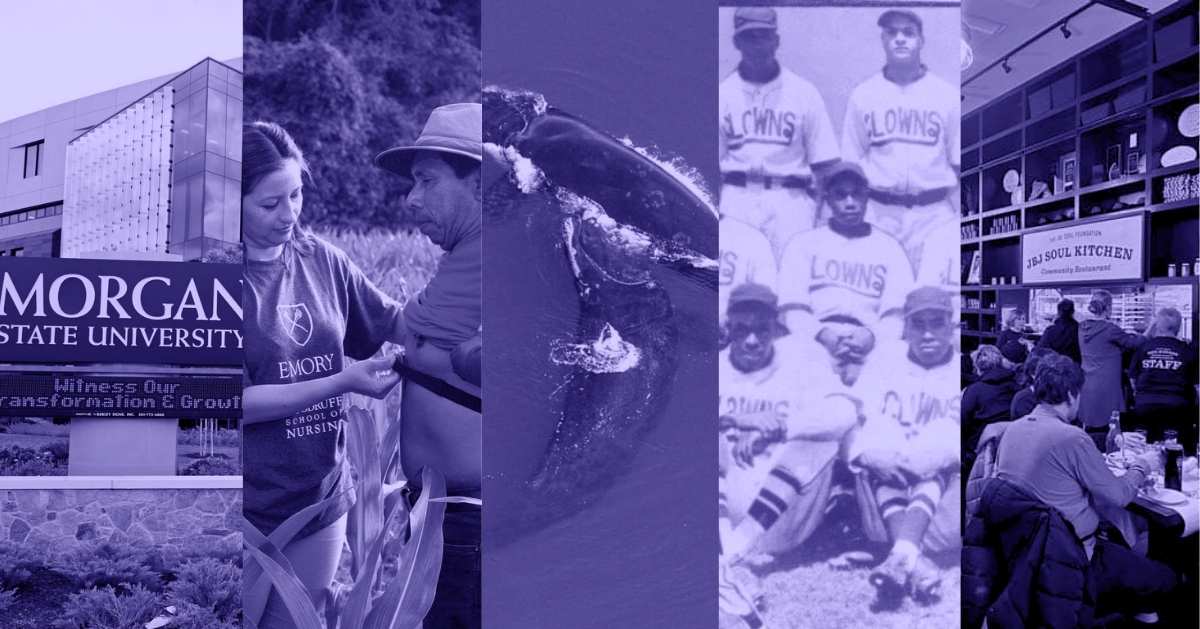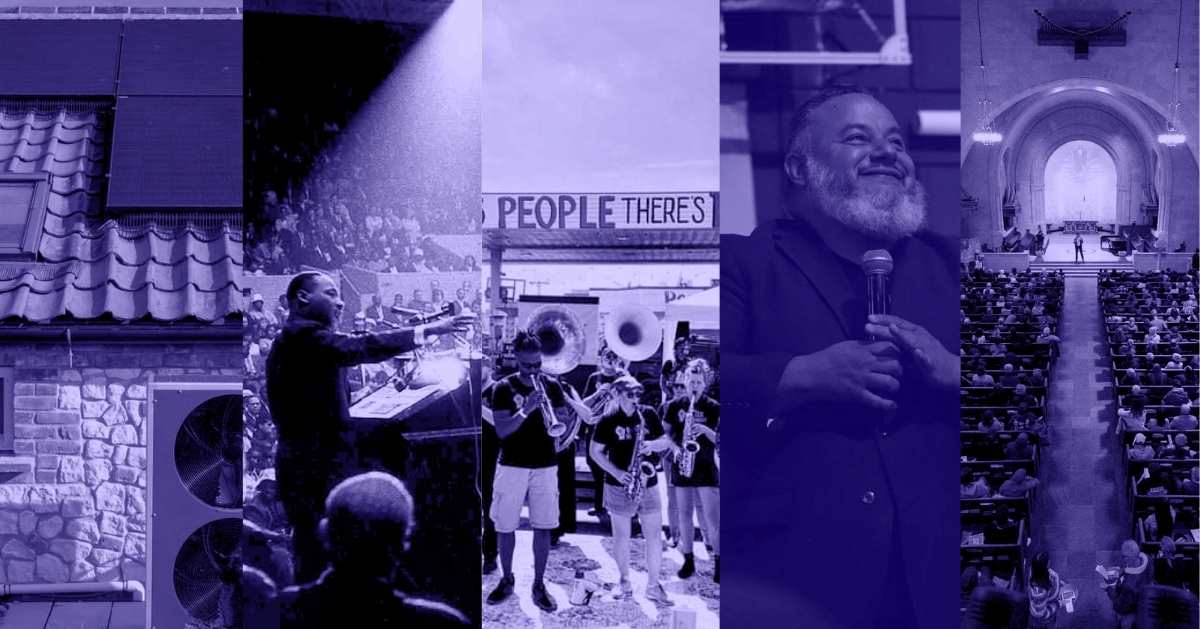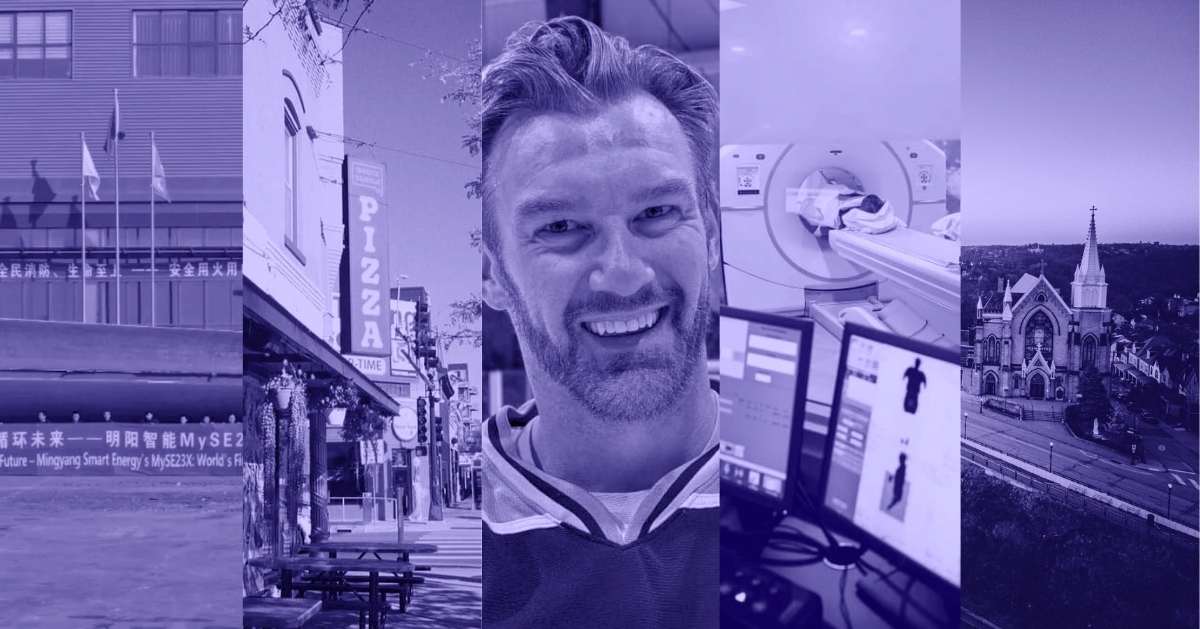Every day the Good Good Good team collects the best good news in the world and shares it with our community. Here are the highlights for this week!
If you want to get good news in your inbox every day, join the Goodnewsletter — the free daily newsletter designed to leave you feeling hopeful.
The Best Positive News We’re Celebrating This Week —
Billionaire philanthropist MacKenzie Scott reduced her stake in Amazon by 42% — while donating millions to DEI causes
In just the past year, billionaire philanthropist MacKenzie Scott cut her stake in Amazon from 139.1 shares to just 81.1 shares — a 42% reduction that equates to roughly $12.6 billion.
In 2020, Scott signed the Giving Pledge — a promise by the world’s wealthiest philanthropists to give the majority of their wealth to charitable causes — and her donations have, so far, outpaced many ofer peers.
In recent months alone, she’s supported DEI causes, including $42 million to expand college access for low-income and largely non-white students, $70 million to HBCU scholarships, and $50 million to scholarships for Native students.
Even more good: In the past five years, Scott has given over $19 billion in no-strings-attached, unrestricted gifts to more than 2,000 nonprofits. She’s done this all relatively quietly, and even breaking her own giving records. The fact that these gifts are unrestricted means the recipients can use them most strategically.
This new at-home appliance turns your plastic bags into compact, recyclable blocks — and later, park benches
An entrepreneur in England is turning discarded plastic fishing nets into 3D printing filament
Frustrated by the piles of discarded plastic fishing nets he’d seen in the harbor near his home in Cornwall that were destined for the landfill — or worse, harming marine life — Ian Falconer was determined to find a better solution.
And he found one: shredding and cleaning the nets, melting the plastic down, and converting it into filament for 3D printing. He also built a “micro-factory” to turn the filament into practical items, like eyeglasses and razor blade handles.
Since launching his company, OrCA, he’s raised more than £1m from small investors in over 40 countries to patent new machinery that can process even more nylon fishing nets with less than 3% of the carbon impact of producing new material.
A nurse and scientist created a wearable patch to detect heat strain in outdoor workers
A scientist at Emory University collaborated with the Georgia Institute of Technology to develop a biopatch for outdoor workers to wear in order to better track and protect their health.
Roxana Chicas’ “comfortable and unobtrusive” patch uses sensors to monitor many vital signs at once, like skin temperature, hydration, heart rate, and blood oxygen levels, with AI detecting early warning signs of overheating.
After migrating from El Salvador to the U.S. at for years old, Chicas was trained as a nurse, and eventually developed the device after hearing about the work her family and friends did in construction and lanscaping, often helping translate medical information for them.
Why is this good news? Everyone deserves a safe, healthy working environment. People who labor outdoors, especially in the sun and heat, are exposed to health variables that require specific attention and monitoring, and this device helps enable medical interventions before they reach emergency-level.
16 years after its original release, FarmVille is back. And it’s saving endangered species in real life
A nonprofit is rescuing dogs from flooding in a remote Alaskan village
While officials work to evacuate over 1,000 people from remote villages on the coast of the Bering Sea in Alaska, where remnants of Typhoon Halong sent devastating flooding, volunteers are working to rescut their pets, too.
Pets weren’t allowed on the military evacuation flights, so people were forced to flee without them. Bethel Friends of Canines learned that 50 to 100 dogs may be left behind, so it organized a charter plane to rescue them. People donated more than $22,000 to support their efforts.
The nonprofit has already successfully reconnected some pets with their owners, but plans to continue caring for them and reconnecting as many others as they can.
→ Read more
Bon Jovi’s ‘pay it forward kitchen’ is serving free meals to furloughed federal employees amid the government shutdown
Bon Jovi’s JBJ Soul Kitchen has always operated on a “pay it forward” model, but two of its locations and one in-library pop-up in New Jersey are now also offering free three-course meals to government employees impacted by the shutdown.
This isn’t the first time the Bongiovis have opened the doors of the kitchen to federal workers in need. During the government shutdown during Donald Trump’s first presidency in 2019, JBJ Soul Kitchen offered the same resources.
Why is this good news? An estimated 1.4 million federal workers are entering a third week either furloughed or working without pay, with about 48,000 in New Jersey alone — about half of whom are serving in the U.S. military.
Those workers may not know how long they’ll be without pay, but they do know a neighborhood restaurant will welcome them with a free meal.
This 3D-printed bridge absorbs 142% more CO2 than conventional concrete — and it’s inspired by human bones
About 60,000 children have avoided developing peanut allergies thanks to a landmark 2015 guidance
In 2015, a landmark study proved that feeding peanut products to young babies could prevent the development of life-threatening allergies.
A decade after new guidance was issued based on those findings, recommending introducing the allergen in infants as young as 4 months old, new research has found it’s prevented about 60,000 children from developing peanut allergies.
The rate of peanut allergies in children ages 0 to 3 fell by more than 27% after guidance for high-risk kids was first issued in 2015, and by more than 40% after the recommendations were expanded in 2017.
The Savannah Bananas partnered with the Negro League Museum to bring back the legendary Indianapolis Clowns
The Savannah Bananas’ Banana Ball Championship League features six teams playing 60 games apiece in 2026. One of those teams is the Negro Leagues’ Indianapolis Clowns, “the greatest barnstorming baseball team for over 50 years.”
The Clowns have been called “the Harlem Globetrotters of baseball,” and their approach to playing baseball is what originally inspired Bananas’ founder and owner Jesse Cole.
Cole said partnering “to bring the Clowns to millions of fans all over the country and preserve their legacy is a dream come true,” and Negro Leagues president Bob Kendrick said it was a “tremendous opportunity to not only entertain, but educate fans about the rich history of the Negro Leagues.”
Good history: Before he became Major League Baseball’s home run king, Hank Aaron got his professional start with the Clowns. He only played there for a few months before he was picked up by the then-Milwaukee Braves, but he always credits the Clowns for giving him the platform to showcase his incredible talent.
After 4-day workweek success, this company is letting employees work whenever and wherever they want
Most people around the world are optimistic that life will improve
Despite data showing that most people believe the world is getting worse, most people are much more optimistic that their own lives will improve.
When asked to rate their lives on a scale from 0 (the worst possible) to 10 (the best) as they are now and where they think they’ll be in five years, most people said their life would be better — and that trend held across a wide range of countries.
In general, humans are a lot more hopeful about our own situations improving than we are about the world.
P.S. Setting the record straight ... even though people perceive the world to be getting worse, the opposite is true in ways you might not expect!
A new study has scientists ‘cautiously optimistic’ about the survival of one of the world’s most endangered whales
North Atlantic right whales were expected to go extinct within our lifetime, but a new report found the population estimate for the critically endangered species was 384 in 2024, an eight-whale increase from the previous year.
The New England Aquarium confirmed that the rare species has shown “slow growth” in the last four years overall.
Although they gained protection from whaling in the 1930s, the North Atlantic right whale remains at risk of vessel strikes and entanglements with fishing gear.
Why is this good news? While this uptick might seem small, it’s actually a considerable milestone for right whales, which have been headed towards extinction. The increase, combined with no detected mortalities and fewer detected injuries, has scientists “cautiously optimistic” about their future.
Austria is turning its boring power lines into giant metal animals — and it’s not just for looks
Analysts predict the next few years will see a renewable energy boom in the U.S.
The federal government may be ending or making it more challenging to secure renewable energy project subsidies — but it’s led companies to race to start and finish wind, solar, and battery projects faster than they perhaps originally planned.
The pipeline for new projects has grown so significantly, analysts are predicting that the U.S. will add record or near-record amounts of renewable energy and batteries through 2027, with one raising its forecast by over 10%.
The nuance: While the U.S. is expected to see an initial boom in renewable energy in the next few years, the efforts to end renewable energy subsidies will mean that fewer wind and solar farms will be developed than would have been if they’d remained in place, “unless something changes.”
→ Read more (Gifted link)
More good news of the week —
A vintage otter t-shirt worn by Taylor Swift raised over $2 million for the Monterey Bay Aquarium. The aquarium teamed up with the original designers of the 1990s-era artwork to reissue it alongside a fundraiser benefiting its Sea Otter Program and other ocean conservation work.
The Boy Scouts debuted two new merit badges in AI and cybersecurity, teaching scouts critical tech skills. The badges introduce Scouts to the fundamentals of AI and automation through hands-on activities and real-world examples in daily life and school that examine ethical concerns like bias and privacy.
Scientists completed the first successful human transplant of a kidney enzymatically converted from blood type A to universal type O. Traditional methods for overcoming blood type incompatibility in transplants require days of antibody removal and intensive immunosuppression for the recipient, while this approach could allow for faster procedures with fewer complications.
The U.K. government approved the country’s largest solar farm, covering around 3,000 acres. When complete, the Tillbridge Solar project will be able to power about 300,000 homes, and marks the 17th nationally-significant clean energy project approved by the government since July 2024.
A U.S. developer is building housing for 2,000 Ukrainians who are mostly displaced from occupied territories. Hansen Village is the creation of Dell Loy Hansen, a Utah real estate developer who has spent over $140 million building and repairing homes across Ukraine since 2
Reducing entanglement by 63%, solar-powered, light-up fishing nets help protect sea turtles. In partnership with local fishers, Arizona State University’s School of Ocean Futures works with a team of researchers dedicated to making fishing gear less harmful to sea turtles, sharks, and other threatened species.
Lightweight and functional, a new wetsuit design provides protection from shark bites. In 2024, there were 71 shark bites globally, with seven fatalities, and while bite numbers have remained stable or decreased in some regions, the overall number of shark bites has increased over the last four decades.
A major study found that water flouridation has dramatically lowered rates of tooth decay in Queensland, Australia. They found 38.8% of children aged five to 10 years had some decay in their baby teeth, down from 49.5% of children studied in 2010-12 when water flouridation was being rolled out across Queensland.
Snoop Dogg released a new song in partnership with GLAAD to support LGBTQ+ youth. The track, titled “Love is Love”, is a collaboration with former The Voice contestant Jeremy Beloate and was featured in the latest episode of Snoop’s animated children’s YouTube series, Doggyland.
Oregon became the first U.S. state to be named an “accessibility verified” travel destination. The designation was a partnership between Travel Oregon and Wheel the World, a travel platform for people with disabilities, which was founded in 2018 by a wheelchair user to identify and promote accessible places to explore.
A North Carolina startup found a way to create lab-grown leather from cow cells; it could change the fashion industry. Cultivated Biomaterials has prototyped small goods like jewelry and wallets, made out of leather grown from the skin cells of a cow named Angel, who is very much alive, grazing at an animal sanctuary in upstate New York.
The U.K. government has committed to creating 400,000 new jobs in clean energy by 2030. Plumbers, electricians, and welders are among 31 priority occupations that are “particularly in demand” with employment in renewable, wind, solar, and nuclear expected to double to 860,000 in five years.
Three Iowa high schoolers founded a book club dedicated to reading some of the country’s most frequently banned books. They started it after learning that thousands of books with sexual content were being pulled from classrooms to comply with a new state law, which was eventually blocked and temporarily paused — but their book club persisted.
A national study found public Montessori programs strengthen early learning outcomes at sharply lower costs. The first national randomized trial of public Montessori preschool students showed stronger long-term outcomes by kindergarten, including elevated reading, memory, and executive function as compared to non-Montessori preschoolers.
A new California law strengthens statewide fire safety standards for grid battery installations. The new law comes in response to a fire that hit the coastal California town of Moss Landing, which had an older type of design, which became the most destructive battery fire in U.S. history.
Seychelles President-elect said he will halt construction on a tourist development on environmentally sensitive land. A resort is under construction on Assumption Island, which is the gateway to the Aldabra atoll, which has one of the most pristine and fragile ecosystems in the world and is home to 400 species found nowhere else on the planet.
Billionaire philanthropists in Houston are donating 95% of their $11 billion fortune to local charities. Nancy and Rich Kinder want to help the city that made them who they are, prioritizing projects like education, arts, and parks, including an $18.5 million expansion of Emancipation Park in Houston’s Third Ward that’s already underway.
Scientists discovered that a “dual feeding” strategy is helping Mediterranean coral thrive in rising sea temperatures. When the Mediterranean’s sea temperatures climb past 29°C, the expels algae from its host cells, losing its brown-orange color, a bleaching event that would be fatal for other corals, but this one survives long enough to regain algae in its host cells during the cooler autumn waters.
Chappell Roan launched her new Midwest Princess Project for trans and LGBTQ+ youth, and it’s already raised $400K. Organizations have already benefitted from the fund, including the Ali Forney Center and The LGBT Center in New York; Trans Wellness Center and TransLatin@ Coalition in Los Angeles; and The GLO Center and The Center Project in Missouri.
A 1960s-era motel in Atlanta was transformed into a colorful affordable housing named after a civil rights icon. A 22-mile trail and transit corridor in the heart of the capital, the Atlanta Beltline is part of a larger effort to build more than 5,000 affordable homes by 2030 and chip away at the thousands of units the city has lost.
A new statue of a postpartum woman was unveiled outside London’s St. Mary’s Hospital as an “homage to motherhood.” The statue was commissioned by Frida founder Chelsea Hirschhorn and brought to life by British digital sculptor Rayvenn Shaleigha D’Clark, and its location outside the Lindo Wing of the hospital is significant and symbolic.
Researchers created a robotic fish that collects plastic pollution and feeds on it, digesting plastic particles and turning them into energy. The more plastic the “robo-fish” eats, the more energy it has to keep swimming, making it one of the world’s first self-sustaining robots built for the environment.
A geophysicist created a program that brings science education to people who are incarcerated. Pioneered in the U.K., the seven-week Think Like a Scientist program is now in Canada, and it’s been life-changing for those who have experienced it, inspiring some to pursue higher education upon release.



